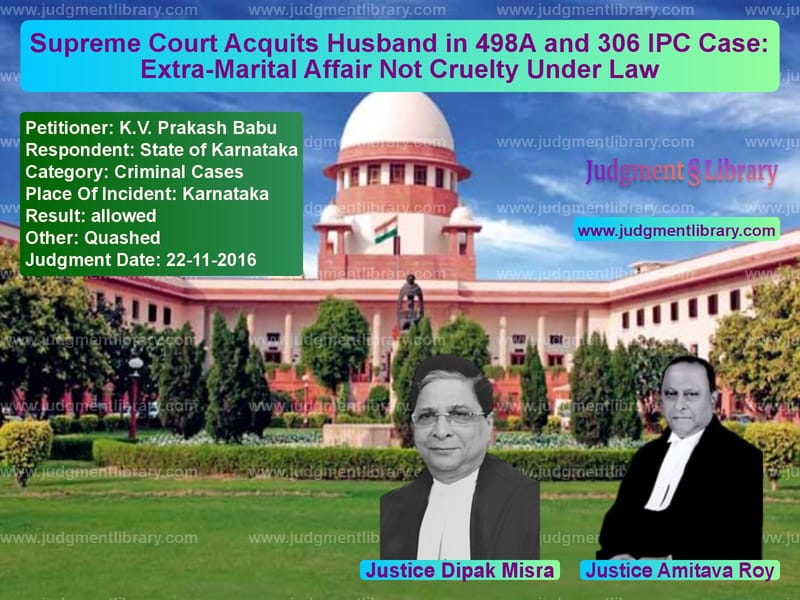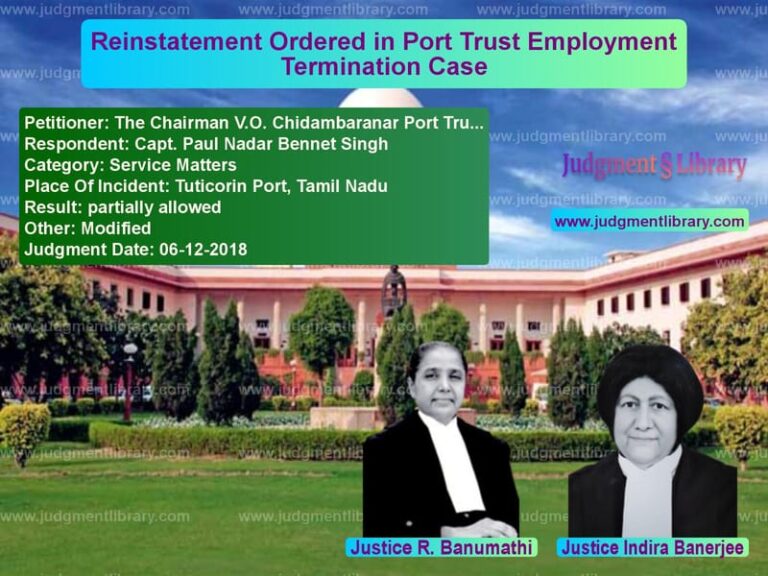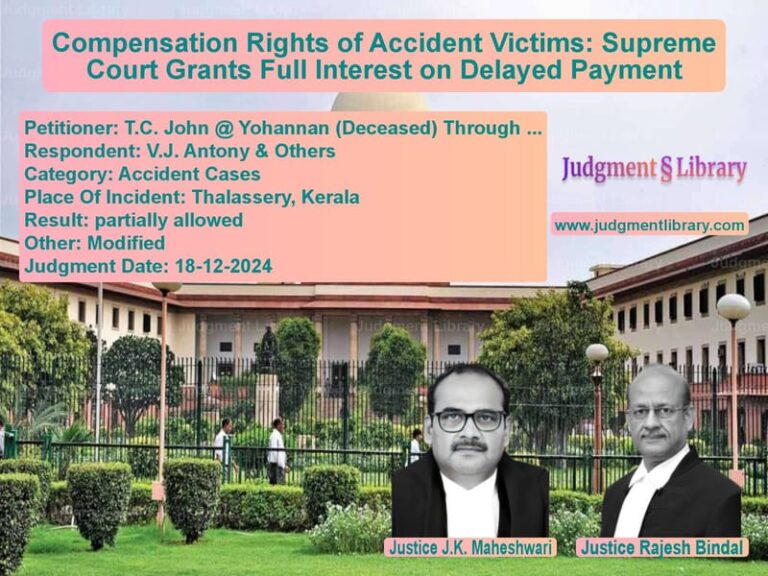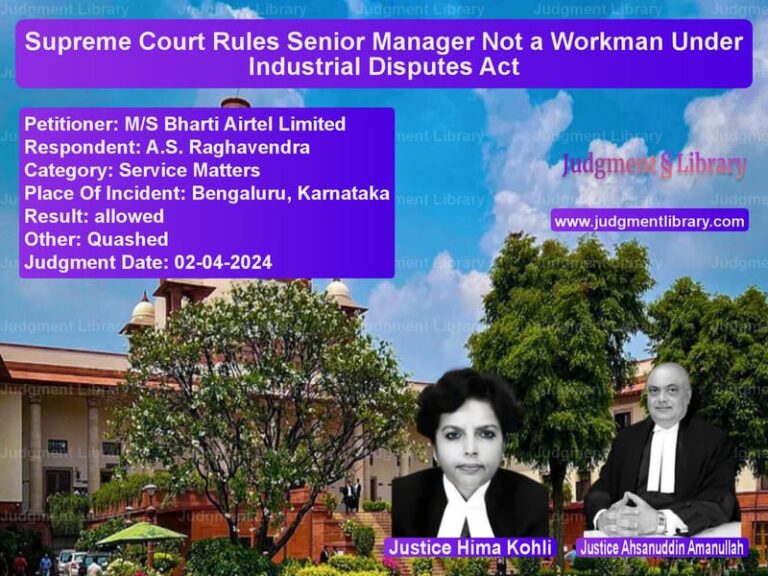Supreme Court Acquits Husband in 498A and 306 IPC Case: Extra-Marital Affair Not Cruelty Under Law
The case of K.V. Prakash Babu vs. State of Karnataka is a significant Supreme Court ruling delivered on November 22, 2016. The judgment clarifies the legal position regarding extra-marital affairs and their relation to cruelty under Section 498A of the Indian Penal Code (IPC). The Supreme Court held that an extra-marital relationship, per se, does not constitute cruelty that would drive a spouse to suicide under Section 306 IPC.
Background of the Case
The appellant, K.V. Prakash Babu, was accused of subjecting his wife, Anjanamma, to mental cruelty due to an alleged extra-marital affair with a woman named Deepa. Anjanamma, unable to cope with her husband’s suspected relationship, committed suicide on August 20, 2004. This tragic incident led to a series of deaths: Deepa, her mother, and her brother also took their own lives due to social humiliation.
The father of the deceased lodged an FIR, leading to a police investigation. The case was charged under:
- Section 302 IPC (murder)
- Section 498A IPC (cruelty by husband)
- Section 306 IPC (abetment of suicide)
- Section 3 of the Dowry Prohibition Act, 1961
The trial court acquitted the accused of Section 302 IPC but convicted him under Sections 498A and 3 of the Dowry Prohibition Act. The Karnataka High Court, on appeal, upheld the conviction under Section 498A IPC but set aside the charge under the Dowry Prohibition Act. However, in the appeal preferred by the State, the High Court convicted the appellant under Section 306 IPC and sentenced him to four years of rigorous imprisonment and a fine of Rs. 50,000.
The appellant challenged this decision before the Supreme Court.
Key Legal Issues Considered
- Did the husband’s alleged extra-marital affair amount to cruelty under Section 498A IPC?
- Could an extra-marital affair alone be the basis for convicting someone under Section 306 IPC?
- Did the evidence justify a conviction for abetment of suicide?
Arguments Presented
Appellant’s (K.V. Prakash Babu) Arguments:
- The trial court and the High Court failed to establish any physical or mental cruelty under Section 498A IPC.
- The wife’s suicide was triggered by suspicion, not by any direct provocation or harassment by the husband.
- The prosecution did not prove that the alleged extra-marital affair led to cruelty severe enough to drive the deceased to suicide.
Respondent’s (State of Karnataka) Arguments:
- The frequent visits of the accused to Deepa’s house were public knowledge and caused the deceased extreme distress.
- Rumors of an extra-marital affair caused social humiliation, which led the deceased to take her own life.
- The trial court and the High Court correctly assessed the mental cruelty suffered by the wife due to the husband’s actions.
Supreme Court’s Observations
The Supreme Court analyzed the provisions of Section 498A IPC and Section 306 IPC, clarifying that:
“Extra-marital relationship, per se, does not constitute cruelty within the meaning of Section 498A IPC. It would be an illegal or immoral act, but other ingredients must be brought home to establish the offense.”
The Court made the following key observations:
- The father of the deceased did not testify to any specific instances of physical or mental cruelty.
- The prosecution relied on neighborhood gossip and speculation rather than concrete evidence.
- Mental cruelty must be of such intensity that it drives the spouse to commit suicide; mere suspicion or societal pressure is not sufficient.
- While an extra-marital affair could be grounds for divorce, it does not automatically establish the offense under Section 498A IPC.
Referring to past judgments such as Pinakin Mahipatray Rawal vs. State of Gujarat (2013), the Supreme Court reiterated that:
“Mere intimacy with another woman, without direct provocation or harassment, does not amount to cruelty under Section 498A IPC or abetment under Section 306 IPC.”
Final Judgment
The Supreme Court ruled:
- The conviction under Sections 306 and 498A IPC was set aside.
- The appellant was ordered to be released immediately, unless he was detained in another case.
- The appeal was allowed, and all charges against the accused were quashed.
Impact of the Judgment
The ruling has several legal implications:
- It reinforces that an extra-marital relationship alone does not amount to cruelty under Section 498A IPC.
- It sets a precedent that mere rumors or social stigma cannot form the basis for abetment of suicide under Section 306 IPC.
- It ensures that allegations of cruelty must be supported by strong evidence before a conviction can be secured.
- It strengthens the principle that mental cruelty must be of a severe nature to be punishable under Section 498A IPC.
Conclusion
The Supreme Court’s decision in K.V. Prakash Babu vs. State of Karnataka is a landmark judgment that clarifies the law on cruelty and abetment of suicide. By setting aside the conviction, the Court ensures that baseless allegations do not lead to wrongful convictions. The ruling serves as an important precedent in matrimonial disputes and criminal cases under Sections 498A and 306 IPC.
Don’t miss out on the full details! Download the complete judgment in PDF format below and gain valuable insights instantly!
Download Judgment: K.V. Prakash Babu vs State of Karnataka Supreme Court of India Judgment Dated 22-11-2016.pdf
Direct Downlaod Judgment: Direct downlaod this Judgment
See all petitions in SC/ST Act Case
See all petitions in Domestic Violence
See all petitions in Bail and Anticipatory Bail
See all petitions in Judgment by Dipak Misra
See all petitions in Judgment by Amitava Roy
See all petitions in allowed
See all petitions in Quashed
See all petitions in supreme court of India judgments November 2016
See all petitions in 2016 judgments
See all posts in Criminal Cases Category
See all allowed petitions in Criminal Cases Category
See all Dismissed petitions in Criminal Cases Category
See all partially allowed petitions in Criminal Cases Category







